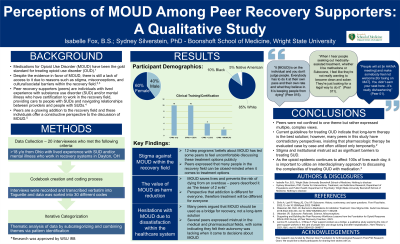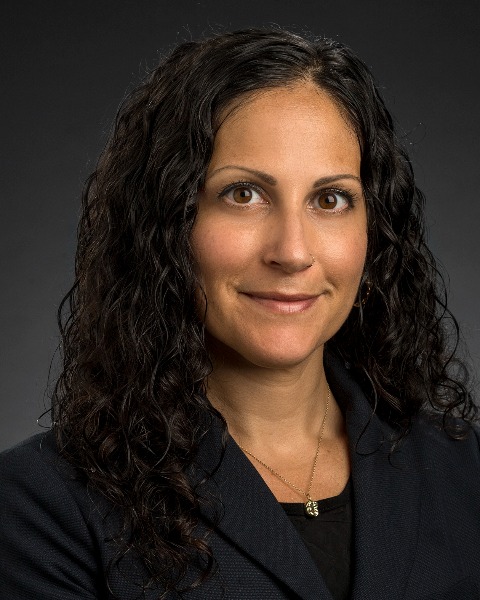Back


(103) Perceptions of MOUD Among Peer Recovery Supporters: A Qualitative Study
Saturday, April 6, 2024
9:45 AM – 1:15 PM

Has Audio

Isabelle Fox
Medical Student
Wright State University Boonshoft School of Medicine, Ohio
Sydney M. Silverstein, PhD
Assistant Professor
Wright State University Boonshoft School of Medicine, Ohio
Presenter(s)
Non-presenting author(s)
Background &
Introduction: Medications for opioid use disorder (MOUD) have been demonstrated to be the gold standard in evidence-based medicine for opioid use disorder (OUD), proving to protect against overdose deaths and improve treatment outcomes.[1] Despite this, there is still a lack of access to MOUD, with stigmatizing impressions, such that it is a “failure of willpower,” a legal way to become intoxicated with opioids, or a replacement of one drug with another.[2,3] Peer support workers (peers) are individuals with lived experience with substance use disorder (SUD) and/or mental illness who have undergone training and certification to work in the field of behavioral health. The peer support field is a growing industry, with nearly 30,000 peers across the U.S. providing influential care for people with SUDs.[4] Peers have been shown to create favorable outcomes in the recovery field, with studies demonstrating correlations between peer support and better adherence to treatment and stronger relationships with providers.[5] As individuals with lived experience and extensive exposure within the recovery field, these participants offer a constructive perspective to the discussion of MOUD. This qualitative study (n=20) aims to identify the perspectives of certified peers from Ohio with regards to MOUD.
Methods: We conducted qualitative interviews with individuals who met the following criteria: 1) >18 years of age; 2) lived experience with SUD and/or mental illness; 3) work within the SUD treatment ecosystem in the Dayton, OH metropolitan area. Interviews were digitally recorded in their entirety, then transcribed verbatim and uploaded to Taguette software for coding and qualitative analysis. We collaboratively developed a codebook, and then divided the interviews for coding. Select codes were then analyzed line by line using Iterative Categorization. Both authors reviewed the findings, further categorizing themes and building on the data to interpret the results.
Results: We identified three main themes pertaining to beliefs, opinions, and experiences of MOUD among peers: stigma against MOUD within the recovery field, the value of MOUD as harm reduction, and hesitations with MOUD due to dissatisfaction within healthcare systems. Peers noted that stigma against pharmacotherapy often originated from 12 step programs, where discourse often does not accept MOUD as a legitimate state of recovery. Peers linked to 12-step programs indicated that they did not feel comfortable discussing their beliefs on MOUD publicly due to fear of retaliation and stigmatization. On the other hand, many interviewees conveyed opinions in favor of the use of MOUD, arguing that it saves lives and prevents the risk of dying from an overdose. A common belief among our sample was that the disease of addiction works differently in everyone, therefore different mechanisms of treatment will be more beneficial depending on the individual, with MOUD serving as a key tactic of harm reduction in a region with consistently high rates of overdose death. Lastly, several interviewees expressed an open mind to the idea of MOUD but were ambivalent due to frustrations with treatment and healthcare systems, skepticism of the medical and pharmaceutical fields, and mistrust due to past personal experiences with MOUD in which they felt their autonomy was lacking. These key findings demonstrate the need for further discussion of MOUD with individuals working within the recovery field with lived experience. Notably, our analysis demonstrated that peers were not confined to one theme, but rather expressed complex and nuanced perspectives that showed the influence of popular recovery rhetoric and the impact of their practice-based knowledge.
Conclusion &
Discussion: The overdose epidemic continues to take 100s of lives each day, necessitating a multifaceted and interdisciplinary approach to treating SUD.[3] Peer support workers are a relatively new addition to the field and a growing aspect of the recovery process in the United States, playing a significant role as a resource for people with SUDs. This study indicates a discrepancy between the current recommendations for treating SUD with medications and the beliefs and opinions of peer supporters, who must navigate between multiple discourses surrounding MOUD, as well as their own lived experiences with addiction and recovery. Evidence clearly suggests the value of MOUD; however, experts may not recognize the extent to which stigma and institutional mistrust factor in as barriers to treatment. Due to the complexity of addiction and vexed ideas regarding MOUD, it is important to address the fears and concerns surrounding MOUD that linger within treatment and recovery communities. It is also crucial to develop strategies to mitigate stigma surrounding the use of medications to support SUD recovery in order to improve health outcomes and reduce overdose death.
References: 1. Sivils A, Lyell P, Wang JQ, Chu XP. Suboxone: History, controversy, and open questions. Front Psychiatry. 2022;13. doi:10.3389/fpsyt.2022.10466482. Wakeman SE, Rich JD. Barriers to Medications for Addiction Treatment: How Stigma Kills. Subst Use Misuse. 2018;53(2):330-333. doi:10.1080/10826084.2017.13632383. Velander JR. Suboxone: Rationale, Science, Misconceptions.4. Supporting and Building the Peer Recovery Workforce Lessons from the Foundation for Opioid Response Efforts 2023 Survey of Peer Recovery Coaches.; 2023.5. Lennox R, Lamarche L, O’Shea T. Peer support workers as a bridge: a qualitative study exploring the role of peer support workers in the care of people who use drugs during and after hospitalization. Harm Reduct J. 2021;18(1). doi:10.1186/s12954-021-00467-7
Introduction: Medications for opioid use disorder (MOUD) have been demonstrated to be the gold standard in evidence-based medicine for opioid use disorder (OUD), proving to protect against overdose deaths and improve treatment outcomes.[1] Despite this, there is still a lack of access to MOUD, with stigmatizing impressions, such that it is a “failure of willpower,” a legal way to become intoxicated with opioids, or a replacement of one drug with another.[2,3] Peer support workers (peers) are individuals with lived experience with substance use disorder (SUD) and/or mental illness who have undergone training and certification to work in the field of behavioral health. The peer support field is a growing industry, with nearly 30,000 peers across the U.S. providing influential care for people with SUDs.[4] Peers have been shown to create favorable outcomes in the recovery field, with studies demonstrating correlations between peer support and better adherence to treatment and stronger relationships with providers.[5] As individuals with lived experience and extensive exposure within the recovery field, these participants offer a constructive perspective to the discussion of MOUD. This qualitative study (n=20) aims to identify the perspectives of certified peers from Ohio with regards to MOUD.
Methods: We conducted qualitative interviews with individuals who met the following criteria: 1) >18 years of age; 2) lived experience with SUD and/or mental illness; 3) work within the SUD treatment ecosystem in the Dayton, OH metropolitan area. Interviews were digitally recorded in their entirety, then transcribed verbatim and uploaded to Taguette software for coding and qualitative analysis. We collaboratively developed a codebook, and then divided the interviews for coding. Select codes were then analyzed line by line using Iterative Categorization. Both authors reviewed the findings, further categorizing themes and building on the data to interpret the results.
Results: We identified three main themes pertaining to beliefs, opinions, and experiences of MOUD among peers: stigma against MOUD within the recovery field, the value of MOUD as harm reduction, and hesitations with MOUD due to dissatisfaction within healthcare systems. Peers noted that stigma against pharmacotherapy often originated from 12 step programs, where discourse often does not accept MOUD as a legitimate state of recovery. Peers linked to 12-step programs indicated that they did not feel comfortable discussing their beliefs on MOUD publicly due to fear of retaliation and stigmatization. On the other hand, many interviewees conveyed opinions in favor of the use of MOUD, arguing that it saves lives and prevents the risk of dying from an overdose. A common belief among our sample was that the disease of addiction works differently in everyone, therefore different mechanisms of treatment will be more beneficial depending on the individual, with MOUD serving as a key tactic of harm reduction in a region with consistently high rates of overdose death. Lastly, several interviewees expressed an open mind to the idea of MOUD but were ambivalent due to frustrations with treatment and healthcare systems, skepticism of the medical and pharmaceutical fields, and mistrust due to past personal experiences with MOUD in which they felt their autonomy was lacking. These key findings demonstrate the need for further discussion of MOUD with individuals working within the recovery field with lived experience. Notably, our analysis demonstrated that peers were not confined to one theme, but rather expressed complex and nuanced perspectives that showed the influence of popular recovery rhetoric and the impact of their practice-based knowledge.
Conclusion &
Discussion: The overdose epidemic continues to take 100s of lives each day, necessitating a multifaceted and interdisciplinary approach to treating SUD.[3] Peer support workers are a relatively new addition to the field and a growing aspect of the recovery process in the United States, playing a significant role as a resource for people with SUDs. This study indicates a discrepancy between the current recommendations for treating SUD with medications and the beliefs and opinions of peer supporters, who must navigate between multiple discourses surrounding MOUD, as well as their own lived experiences with addiction and recovery. Evidence clearly suggests the value of MOUD; however, experts may not recognize the extent to which stigma and institutional mistrust factor in as barriers to treatment. Due to the complexity of addiction and vexed ideas regarding MOUD, it is important to address the fears and concerns surrounding MOUD that linger within treatment and recovery communities. It is also crucial to develop strategies to mitigate stigma surrounding the use of medications to support SUD recovery in order to improve health outcomes and reduce overdose death.
References: 1. Sivils A, Lyell P, Wang JQ, Chu XP. Suboxone: History, controversy, and open questions. Front Psychiatry. 2022;13. doi:10.3389/fpsyt.2022.10466482. Wakeman SE, Rich JD. Barriers to Medications for Addiction Treatment: How Stigma Kills. Subst Use Misuse. 2018;53(2):330-333. doi:10.1080/10826084.2017.13632383. Velander JR. Suboxone: Rationale, Science, Misconceptions.4. Supporting and Building the Peer Recovery Workforce Lessons from the Foundation for Opioid Response Efforts 2023 Survey of Peer Recovery Coaches.; 2023.5. Lennox R, Lamarche L, O’Shea T. Peer support workers as a bridge: a qualitative study exploring the role of peer support workers in the care of people who use drugs during and after hospitalization. Harm Reduct J. 2021;18(1). doi:10.1186/s12954-021-00467-7
Learning Objectives:
- Upon completion, participant will be able to discuss and debate using medications for opioid use disorder (MOUD) from multiple perspectives, including those with lived experience.
- Upon completion, participant will be able to recall the importance of peer recovery workers and their role in the behavioral health field, especially in relation to treating substance use disorders.
- Upon completion, participant will be able to identify common beliefs about treating substance use disorder that are points of tension faced in the medical, pharmaceutical, public health, and recovery fields.
